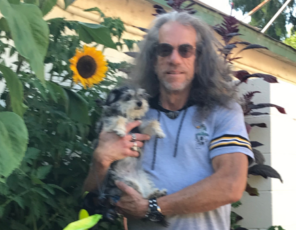
Peers and Mental Health Recovery with Sean Kelson
Our guest, Sean Kelson, has faced mental health challenges since he was a child. He’s also spent over a decade at the Interlink Self-Help center in Santa Rosa, California, helping other people make peace with the mental and emotional disabilities. Now, he’s talking to the movers and shakers in Sonoma County’s wine county about the need to invite sobriety into our community culture.
We talk to Sean about his personal journey and what he’s learned about using peer support to deal with severe mental health issues. Is it possible to have a meaningful, connected life while living with an emotional disabilities? Sean not only answers with a powerful, “Yes;” he tells us how we can get there too.
A superhero in his own life, Sean has tools in his tool belt that would benefit Batman. And, when someone tells him, “Don’t worry; That’s normal.” He replies, “Hey, Dude, Set your sights a little higher!”
Interlink Self-Help Center
1033 Fourth St., Santa Rosa, CA 95404
Phone: (707) 546-4481
https://interlinkselfhelpcenter.org
Interlink is a project of West County Community Services, which also administers three other mental health peer support centers in Sonoma County.
Sean Kelson told us that longitudinal studies show that many people who live with mental disabilities recover, apparently without any relationship to the kinds of help and/or medication they receive. One source of that information is the book Rethinking Madness. See chart on The link to the book is here: https://rethinkingmadness.com/wp-content/uploads/2021/12/Rethinking_Madness_completeBook.pdf
15+ Year Longitudinal Schizophrenia Recovery Studies: This is a chart from Rethinking Madness – page 40 of the book (page 65 of the pdf) – which lists twelve 15-27 year studies that showed many people improve in their mental health. The largest study looked at 502 people over 22.4 years. It found that 65% recovered or improved ~ and 22% fully recovered.
After the program aired, Mr. Kelson refined his statement to say, “in regards to the studies I mentioned: Data from these studies showed that between 36 and 84% improved or recovered and between 5 and 54% fully recovered.”
Sean Kelson also talked highly of Smart Recovery, which offers free meetings and tools to help build a meaningful, connected life at SmartRecovery.org.
This program produced and hosted by Adrienne Lauby.
Audio editing by Shelley Berman

